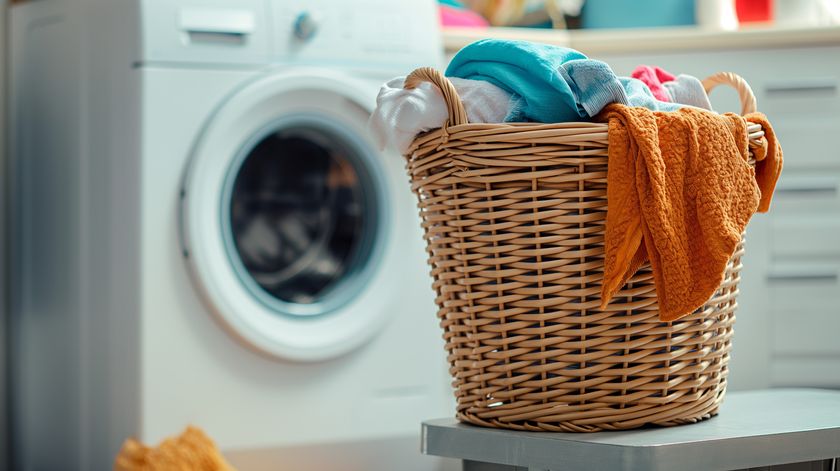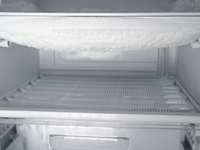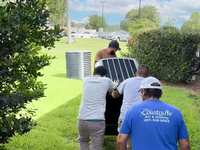- Categories :
- More
Washer Not Spinning? 9 Common Causes (And How To Fix Them)

A washer not spinning properly can turn a quick load of laundry into a sopping mess.
If your clothes are coming out wet or not clean or your washing machine starts and stops, the problem could be caused by several issues. Learn how to determine what’s causing the problem, some quick fixes, and when to call a professional.
Reasons your washer won’t spin may include:
- Too-heavy loads
- Unbalanced loads
- Unlevel washer
- Broken or stuck spin switch
- Poor drainage
- Burned-out motor
- Malfunctioning drive belt
- Drain hose blockage
- Power source issue
1. Too-Heavy Loads
Filling up the washing machine too much may cause the machine to not spin at full speed. Heavy loads can also cause your washer to "walk" or move forward during the spin cycle. Newer machines with sensors won't start at all if the load is too heavy.
When a washing machine is overloaded, it throws off the weight distribution, causing the machine to detect an imbalance. To prevent damage to the appliance, the machine's sensors automatically stop the spin cycle. This overload sensor is essential to prevent an unbalanced load, which can lead to excessive vibration, noise, and potential mechanical damage to the machine's components.
How To Fix It
The easiest method to avoid an overfilled washer not spinning clothes dry is to try washing smaller loads. Most washing machines include a fill-to line on the inside of the drum that you should adhere to. In addition, don't pack laundry tightly into the machine, distributing it evenly instead.
If the problem persists, contact an appliance service professional to address the issue.
2. Unbalanced Loads
An unbalanced load can cause a washing machine to stop spinning mid-cycle. This occurs because the machine's sensors detect an uneven distribution of weight within the drum. This often occurs when heavier items, like jeans or bedding, clump together and stay on one side of the machine or if items wrap around the agitator during the wash. It can also occur if the machine is overloaded or underloaded, causing an imbalance and even a risk of leaks.
Mechanical problems with the machine, such as worn-out shock absorbers or suspension springs, can also contribute to imbalance, even with a balanced load.
How To Fix It
To resolve the issue, pause the cycle, open the lid, and redistribute the laundry more evenly around the drum. Once the load is balanced, restart the spin cycle. It's important to avoid overloading the machine, as this can contribute to an unbalanced load and hinder the spin cycle's effectiveness.
If the issue is mechanical, a service professional can examine the machine to determine the cause and repair or replace any necessary parts.
3. Unlevel Washer
Washing machines come on four small pedestal legs, which can become uneven during repeat wash and spin cycles. This causes the signature rocking or “walking” and loud noises often associated with the spin cycle.
This imbalance can cause the machine's sensors to detect instability, triggering the safety mechanism that stops the spin cycle prematurely. An uneven machine can also put extra strain on its internal components, potentially leading to premature wear and tear.
How To Fix It
To ensure optimal performance and longevity, it's crucial to level your washing machine. Use a level tool to check if the machine sits evenly on all four feet. If not, adjust the feet accordingly to correct the imbalance. By taking this simple step, you can prevent unnecessary issues and maintain the efficiency of your washing machine.
If this problem has been occurring for some time or is not resolved by adjusting the feet, it’s time to call a professional. They will inspect the machine thoroughly to ensure that the internal components are operating optimally and offer solutions to improve its longevity.
4. Broken or Stuck Spin Switch
A machine that drains but doesn’t spin, leaving items sopping wet, is most likely caused by a displaced or faulty lid switch. This small switch should be pressed down by the lid when it’s closed. If it isn’t pressed down, your machine may prevent the spin cycle as a safety measure.
How To Fix It
It's best to have a service professional look at it to ensure it is fixed properly.

5. Poor Drainage
Poor drainage can significantly affect a washing machine's ability to spin. If water can't drain properly, the machine's sensors may detect excess water levels, preventing the spin cycle from even starting. This safety measure is designed to protect the machine from potential damage caused by excessive water.
Poor drainage can also lead to longer wash cycles as the machine attempts to remove excess water. This can result in increased energy consumption, potential wear and tear on the machine's components, and even an increase in mildew and















